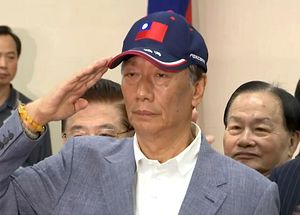Foxconn founder Terry Gou may not be his party’s chosen candidate, but Taiwan’s richest man is now “seriously considering” an independent presidential run, according to an aide.
Gou, 68, resigned as Foxconn chairman ahead of his bid to win the Kuomintang (KMT) party primary, which he lost to Kaohsiung mayor Han Kuo-yu. But the billionaire has stayed politically active as Han’s campaign has faltered. Last week, Gou made a high-profile public appearance with Taipei mayor Ko Wen-je and KMT power broker Wang Jin-pyng, adding fuel to rumors of an alliance.
During the KMT primary, Gou touted his business acumen as the antidote for a stalling Taiwanese economy under President Tsai Ing-wen of the Democratic Progressive Party (DPP). In June, he met U.S. President Donald Trump in Washington and posed in front of the White House wearing a customized cap bearing the Republic of China (ROC) and United States flags.
Gou is said to consider Trump a political role model, and the two are alike in more ways than a shared taste in headwear: They both received “small loans” to start their business careers, neither of them has held a previous political office, and they have both been criticized for comments disrespectful of women.
The similarities don’t end there: Gou has his own checkered business past as head of a company that has seen multiple waves of worker suicides, reports of employees being underpaid and overworked, and several serious safety violations at its production plants in China, where Foxconn manufactures Apple’s iPhones.
More recently, Foxconn has found itself associated with alleged illegal union-busting within a global subsidiary. On August 17, protesters gathered outside the headquarters of Hon Hai Precision Industry, the name by which Foxconn trades, over claims that the Foxconn subsidiary Sharp has illegally targeted union members in Japan for dismissal and has attempted to stop employees from unionizing.
Sharp laid off around 3,000 foreign workers last December as it moved production of iPhone sensors from Japan to a Foxconn-owned plant in China. The workers, most of whom are South Americans of Japanese origin, were on temporary contracts and employed via a third-party subcontracting agency. Workers have alleged that their subcontractor attempted to intimidate members of Union Mie, the union for workers at the central Japan Sharp factory.
The company has indicated it will consider hiring back the dismissed workers, who are also demanding back pay.
Protesters in Taiwan, where migrant workers regularly face work abuse and financial exploitation, saw Sharp’s actions as indicative of Foxconn’s global negligence toward the work conditions of its employees. Gou’s corporate empire has been connected to severe allegations relating to labor practices further down the supply chain.
Foxconn has also come under scrutiny at home in Taipei. Hon Hai placed 50th in a recent corporate social responsibility ranking of Taiwan’s largest corporations published by Taiwan-based CommonWealth Magazine. Globally, its CSR rankings range from average to below average.
Gou may have built a corporate behemoth, but questions remain over how he would function in the highest office of a government responsible for a population of 23.5 million facing major demographic changes. Taiwan is experiencing a continued “brain drain” as young professionals move to other countries, including China and the United States, even while the country transitions into a super-aged society.
In June, during his unsuccessful KMT primary run, Gou urged Apple to move iPhone production from China to Taiwan. (Earlier reports indicate a higher likelihood of some production to shift to India or Vietnam.) He has made attempts to win over young voters by promising an economic rejuvenation, but he has yet to shake off the concerns of Taiwan’s largely China-skeptical younger electorate that his plans may involve an uncomfortable level of cross-strait enmeshment.
If he continues to model his nascent political career after that of Donald Trump, he will reportedly do so by seeking the help of Ko – the Taipei mayor who flirted with his own presidential run but has said he would support Gou – and Wang, who appears eager to challenge the KMT’s Han Kuo-yu led ticket. A political troika of the three could be formidable, especially if Han’s populist insurgency loses steam or Tsai, the incumbent, faces domestic issues that steer her away from her strengths in cross-strait messaging and courting international support.
Gou, a political novice, has few reference points for Taiwanese voters should he lead the ticket – and a look at Foxconn’s history could give them pause.

































